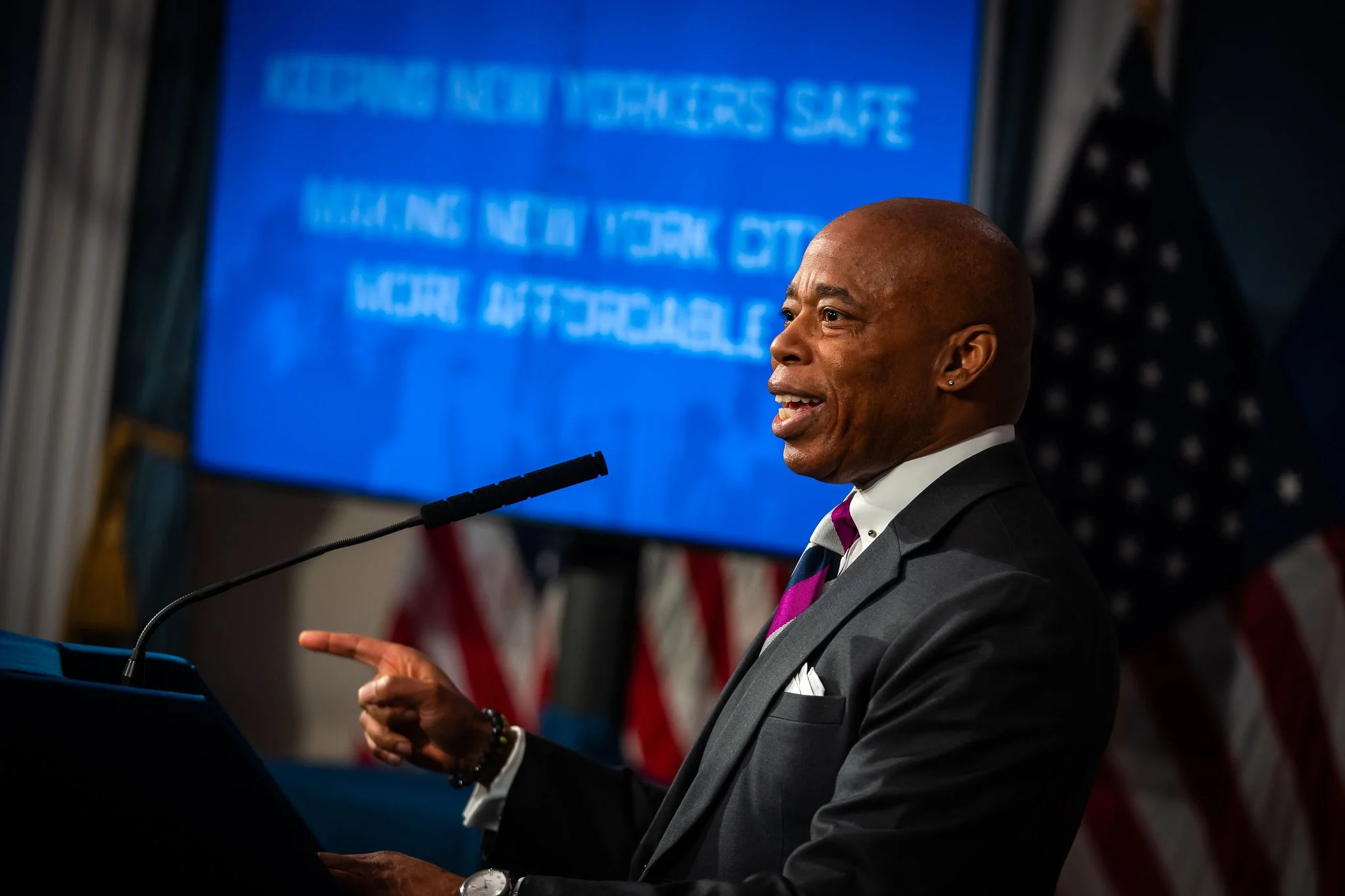Mayor defends his record on Rikers as federal takeover looms
/New York City Mayor Eric Adams defended his administration’s efforts to reform Rikers around a week after a federal judge found the city in contempt of a 2015 consent judgment surrounding civil rights in the jail complex. Photo by Ed Reed/Mayoral Photography Office
By Jacob Kaye
Mayor Eric Adams on Tuesday defended his administration’s efforts to quell violence and disorder on Rikers Island, a little less than a week after a federal judge said she was leaning toward taking the jail complex out of the city’s hands for its failure to keep detainees safe.
The mayor, who has seen over two dozen people die in custody since he’s been in office, claimed conditions on Rikers were “starting to turn a corner” on Tuesday during his weekly “off-topic” press conference, touting the efforts of Department of Correction Commissioner Lynelle Maginley-Liddie, who Adams appointed a year ago.
His remarks on the jails were the first since U.S. Southern District Chief Judge Laura Swain found the city in contempt of a nine-year-old court order designed to make life on Rikers safer for detainees.
Swain, who said there had “been no substantial reduction in the risk of harm currently facing those who live and work in the Rikers Island jails” since the start of the consent judgment in the “Nunez” case in 2015, also hinted that she was “inclined” to impose a federal receivership over the jails, or a court-appointed third party that would, in some capacity, assume leadership of Rikers.
But Adams, who has put law enforcement and public safety at the center of his first term in City Hall, said the historic ruling was not a condemnation of him nor of his administration, but rather of the mayors and Department of Correction commissioners that came before him and Maginley-Liddie.
“Rikers has always been a mess as long as I can remember,” Adams said. “This is not an Eric Adams issue – it is the history of Rikers Island.”
The mayor, who again claimed on Tuesday that he had visited Rikers “more than any mayor in the history of the city,” also repeated his opposition to receivership, which he said hinges on the fact that federal jails are, in some cases, run no better than the city’s jails.
“It is not like federal prisons are pictures of what's great about the institution,” he said.
“But the judge, she has the power to make the decision,” he added. “And we're going to follow whatever decision she makes.”
While violent conditions on Rikers have largely persisted on Rikers Island since 2015, when the city agreed to the consent judgment stemming from the detainee civil rights case known as Nunez v. the City of New York, they saw a spike in 2021, the year before Adams took office. The violence has mostly not been abated under Adams, and, in some cases, has gotten worse.
In 2022, 19 people died in DOC custody, a 10-year high. Nine people died the following year and five have died in 2024.
Under Adams, stabbings and slashings, assaults on staff, fights between detainees, and use of force incidents have all been more frequent than they were before the pandemic, according to DOC data.
While Swain didn’t blame Adams for the contempt ruling in her decision last week, she also didn’t absolve the mayor of contributing to the crisis.
The judge, in part, blamed the revolving door of political leadership of the city and of the DOC and the fact that any momentum toward reform of Rikers over the past decade has been interrupted by change at the top. It was the constant switching of leadership that led Swain to suggest a receiver may be the only means to correct conditions in the jails.
“The last nine years also leave no doubt that continued insistence on compliance with the court’s orders by persons answerable principally to political authorities would lead only to confrontation and delay; that the current management structure and staffing are insufficient to turn the tide within a reasonable period; that defendants have consistently fallen short of the requisite compliance with court orders for years, at times under circumstances that suggest bad faith; and that enormous resources — that the city devotes to a system that is at the same time overstaffed and underserved — are not being deployed effectively,” Swain said.
Last year, Adams replaced his first DOC commissioner, Louis Molina, with Maginley-Liddie after Molina’s relationship with Swain’s court–appointed monitor, Steve J. Martin, began to deteriorate.
In May 2023, Molina withheld information from the monitor about five serious incidents that unfolded in the jails, two of which resulted in a detainee’s death. Shortly after Martin discovered the incidents and reported them to Swain, the judge said that she would allow receivership proceedings to begin.
Maginley-Liddie’s appointment in December 2023 was celebrated by the monitor and Swain, who again praised the commissioner in her ruling last week.
However, the judge said that she ultimately felt that no matter how dedicated to reform the new commissioner is, it won’t be enough to turn things around on Rikers.
“While the court has no reason to doubt Commissioner Maginley-Liddie’s abilities, recent accomplishments and good intentions, in assessing defendants’ years of desultory efforts to comply with the contempt provisions and the unconstitutional conditions that have persisted despite the steps defendants have taken, the court simply cannot ignore the history of noncompliance and ineffective measures and restart the clock each time a commissioner is replaced,” Swain said “Defendants are responsible to the court and the people in their care and are also responsible for the just consequences of their actions and inaction.”




